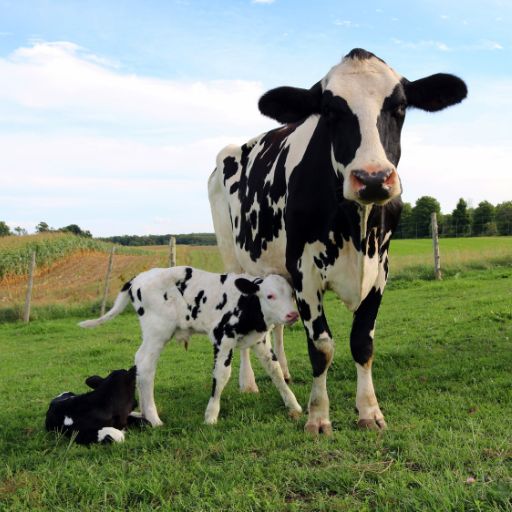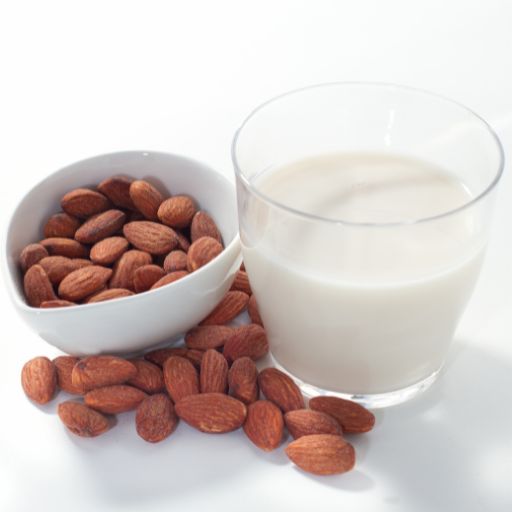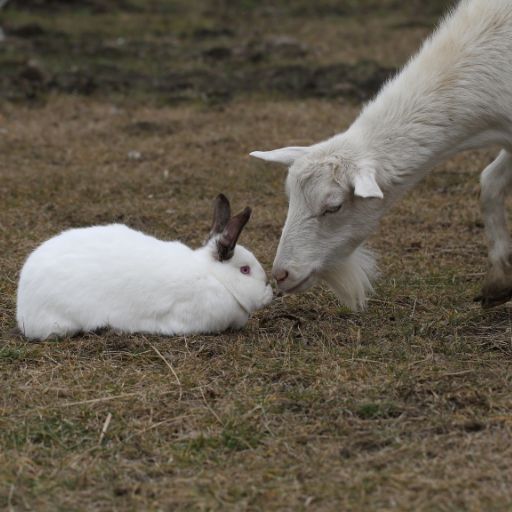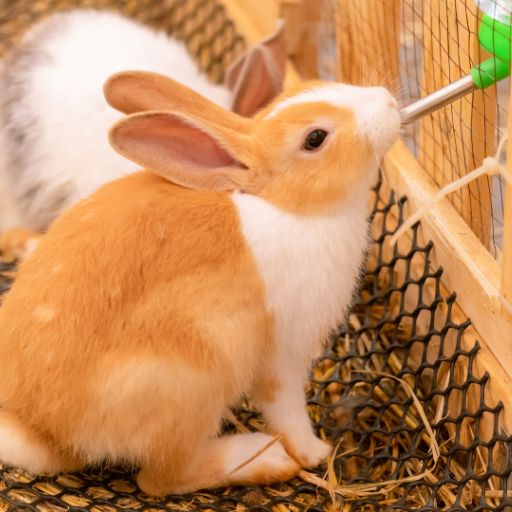Whether you’ve come across a nest of baby rabbits, or want to give your adult rabbit something to drink other than water, you may have considered milk. But can rabbits drink milk? The short answer is no.
Baby rabbits without a mother need milk to survive. If you find a nest of baby rabbits, the best type of milk you can give them is another lactating rabbit, kitten milk replacer, rabbit milk formula, or goat milk.
I’ll cover why different types of milk are bad for rabbits in the post below.
Can Rabbits Drink Milk?
Adult rabbits are lactose intolerant, which means they cannot drink cow milk. But that’s not the only type of milk that rabbits should avoid.
Cow’s Milk

Cows milk is nutritionally complete for calves, not rabbits. Rabbits won’t turn their nose up at cow’s milk, the sweetness is likely to tempt your rabbit into convincing you they need to share your cereal, hot chocolate or milkshake. But as rabbits are lactose intolerant, the protein, fat and carbohydrates will disturb your pet’s sensitive stomach.
Rabbits are incapable of vomiting, so instead the cows milk will sit in their stomach, which they cannot digest well. This could lead to several health issues such as obesity, gastrointestinal stasis and death.
You should never give cows milk to a baby rabbit, even if diluted. They are unlikely to survive if fed cow milk.
Almond Milk

Almond milk doesn’t have any lactose and cholesterol. It is also free from gluten and casein, making it a popular choice for human consumption, particularly on a plant based diet. Unfortunately, when it comes to your pet rabbit, this nut based milk can cause digestive problems. You wouldn’t feed your rabbit whole almonds, so don’t feed your rabbit almond milk either.
Goat Milk

Goat milk contains less sugar, lactose, protein and fat than cow milk, making it an option to feed your rabbit in small amounts, or if you need to feed baby rabbits in a hurry and there is no other choice. Goat milk is easier to digest as the fat molecules are much smaller. It also contains less hormones, but this also can depend on the species of goat.
Lactose Free Milk
As lactose is one of reasons why you should not give cows milk to rabbits, surely removing the lactose will make it okay? Unfortunately no. There are other reasons such as the higher fat content that make lactose free milk unsuitable for rabbits, both baby rabbits and adults alike.
Kitten Milk Replacer
Kitten milk replacer is the best option for a baby rabbit. Milk from mother rabbits and kitten milk replacer are quite similar to each other in terms of richness and calories. Kitten milk replacer is made from whey protein, milk, oils, eggs, vitamins and minerals. Kitten milk replacer is generally fed to domestic baby rabbits, where as goat milk is more suited to wild rabbits.
Oat Milk
Oat milk contains no beneficial nutrients for your pet rabbit or rabbits in the wild. You should not give your rabbit oat milk at any stage of its life.
Rice Milk
89% of rice milk is water and it contains negligible amounts of protein and fat. The whole composition of the rice milk is entirely different from Rabbit Milk. Baby rabbits require more protein in their early childhood for the healthy development of their bones. Rice milk doesn’t contain any essential nutrients required by your bunny and should be avoided.
Coconut Milk
Coconut milk contains an exorbitant amount of 23% fat. This high amount of fat can cause obesity and other Gastrointestinal problems in your bunny. Baby rabbits shouldn’t drink coconut milk either. Stick with the recommended milks above.
Soy Milk
Soy milk is produced from soybeans and it contains high protein and fat percentages. This can lead to obesity, and enteritis and slow down your bunny digestive system (GI stasis). There is no problem with your bunny having a few drops. But it can lead to serious health issues if taken in excess.
Evaporated Milk
Evaporated milk is dairy based, with around 60% of the water removed before being heat treated and canned. It is still a form of cows milk and therefore not suitable for adult or baby rabbits.
Powdered Milk
Powdered milk is usually dairy based and not suitable for baby rabbits. If you can get hold of powdered goat milk, this can be used to supplement a baby rabbit, as goats milk is most similar to their mother’s milk.
What Can Rabbits Drink?

Clean Water
Clean Tap Water is one of the best drinks you can feed your Bunny. Distilled, Pool, and puddle water are unsafe for your rabbit to drink. When it comes to the amount of water rabbits need, it can vary. On average a rabbit would drink around 1-2 cups of water per day. Large and pregnant rabbits may consume more water than usual. Some rabbits who are active most of the time also drink more water, especially in Summer.
Most rabbit foods such as fresh leafy greens contain a good amount of water. So, sometimes your rabbit can be getting in its water through its diet. Water bowls are the best way to feed your bunny. But you can also go for hanging water bottles if your rabbit is a sloppy drinker or just flips water bowls all the time.
Make sure to always track your Rabbit’s water intake. Not drinking enough water can make your rabbit sick. And excessive thirst can be a symptom of kidney failure, diarrhea, etc. So, if your bunny is consuming more water despite hot weather or diet changes, it can be a sign of a serious issue.
Herbal Teas
Providing herbal teas to your rabbit comes with numerous benefits. The obvious one is herbal teas help your bunny stay hydrated. They help them physically by calming joint pain and other digestion issues. They also help them relieve their mental stress and anxiety. You can provide your rabbit with:
- Peppermint tea.
- Chamomile. tea.
- Lavender tea.
- Oregano tea.
- Rosemary tea.
Wild and captive rabbits eat these herbs and are completely safe for your rabbit. Great tea and Black tea contain caffeine and are unsafe for your pet. Bunnies are lactose-intolerant. So, don’t mix any milk into the tea and definitely do not add sugar.
Water Flavored with a few drops of natural vegetable or fruit juice
Flavored waters can be a tasty healthy treat you can feed your bunny. Or it can help your bunny get into the habit of drinking water. To prepare flavored water, just add some unsweetened juice of your bunny’s favorite fruit or vegetable. It can be something such as carrots, celery, or apple juice. Just make sure that the fruit or vegetable you pick is safe for bunnies.
What Happens if a Rabbit Eats Dairy?
Rabbits are lactose-intolerant animals. Any kind of dairy product is unsafe for rabbits. There’s no problem if your rabbit manages to lick any dairy product once behind your back. But feeding dairy regularly can lead to GI stasis and other gut problems.
Studies prove that rabbits’ daily consumption of milk can lead to an increase in nucleated cells and T lymphocytes. High sugar and fat in dairy can cause obesity and tooth decay in your rabbit. Dairy foods are also high in calcium. High calcium in rabbits can lead to Urinary tract blockage and the development of kidney stones.
But there is only one exception to this no dairy rule. Sometimes rabbits will be given diluted yogurt water to encourage the growth of endemic bacteria flora and to treat diarrhea. However, this should be given only by the advice of your vet.
Always make sure to track your rabbit’s eating and pooping habits to avoid any complications.
Do Baby Rabbits Drink Milk from Their Mother?
Yes, baby rabbits depend on their mother to obtain milk. Baby rabbits can’t digest cow’s milk easily, so mother rabbits’ milk is the best for them. Unlike other animals, rabbits feed their kits only once or twice a day.
If the rabbit has a sunken stomach, blue skin tone, and is crying out, then it means the rabbit is probably orphaned. You will find it lying around lethargic sadly. Milk from other nursing female rabbits is the best option for orphaned rabbits. Kitten formula and goat’s milk are the other alternatives. Baby rabbits have a sensitive digestive system. So, you need to be more careful while raising an orphaned rabbit.
When Do Baby Rabbits Stop Drinking Milk?
Baby bunnies usually stop drinking milk after 3-6 weeks. The feedings will gradually decrease over time until they stop ultimately. Baby rabbits usually start taking solids at 2-3 weeks old. But they are still not completely prepared for weaning.
If you have an orphaned rabbit, it is best to provide it with milk for 6 weeks completely. After 6 weeks you can substitute milk for water completely. You can syringe feed for some weeks. Once it starts to open its eyes and move around, you can feed it in a bowl.
What Kind of Milk Can Baby Rabbits Drink?
Rabbits can have goat’s milk and Kitten Milk Replacer. Although mother rabbit’s milk is the best, it can be hard to find it to feed orphaned baby rabbits. Kitten’s Milk Replacer is the first best option you can feed your baby rabbit. It fulfills the required nutritional needs of your baby bunny. As previously mentioned, you can use goat’s milk only as part of the formula and in other emergencies. Here is the amount to feed domestic rabbits
- Newborn: 2.5 cc/ml formula per feeding.
- 1 week: 6-7 cc/ml formula per feeding.
- 2 weeks: 12-13 cc/ml formula per feeding.
- 3-6 weeks: 15 cc/ml formula per feeding.
Can Baby Rabbits Drink Water?
Yes, Baby Rabbits can drink water. Water plays a big role in a rabbit’s diet. So, it is beneficial to encourage your bunnies from an early age to drink water. In addition, baby bunnies’ food is mostly dry, so it is important to feed them with an adequate amount of water.
Is There a Homemade Rabbit Milk Replacer for Rabbits?
Yes, here is the guide on how to make it.
Ingredients:
1 cup of goat milk, 56 grams of powdered goat milk, and 1 tsp of Sugar-free heavy whipping cream.
Procedure:
- Take 1 cup of goat milk in a bowl and mix it with 56 grams of powdered goat milk. Mix both of them.
- Add a tablespoon of sugar-free heavy-whipping cream to create a similar formula to kitten milk replacer. Stir the mixture well.
- Last, heat the complete mixture to 98-100℉.
Can You Feed a Baby Rabbit Infant Formula?
Infant formula is primarily based on cow’s milk. Although baby rabbits are not lactose-intolerant yet, cow’s milk is still harmful to them. Cow milk and rabbit milk don’t resemble each other and cows milk is of no benefit to an orphaned or young rabbit.
